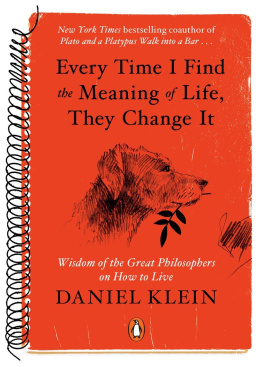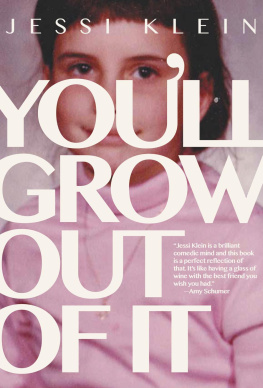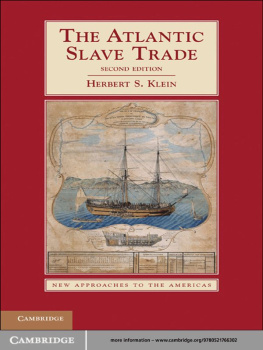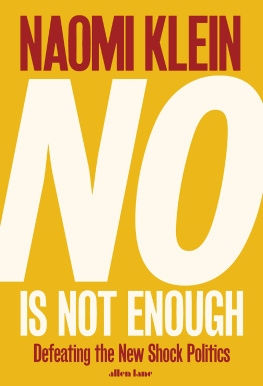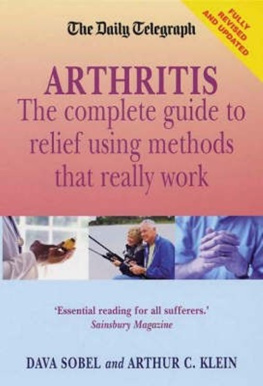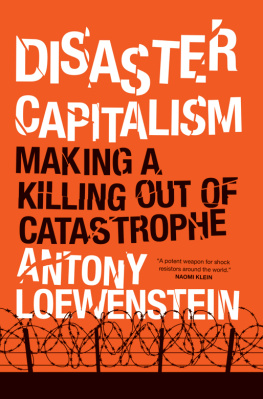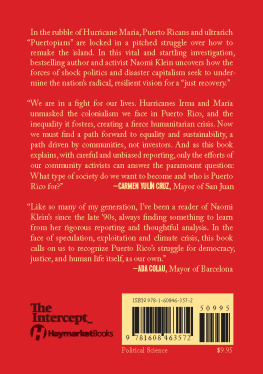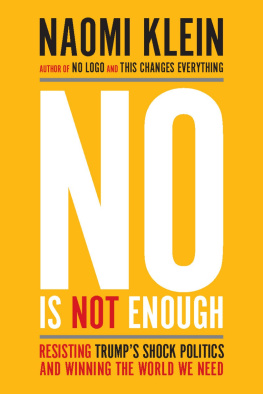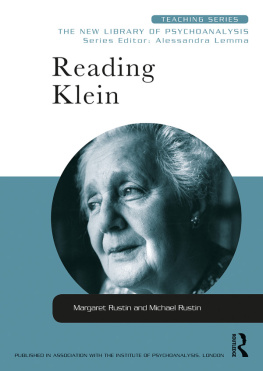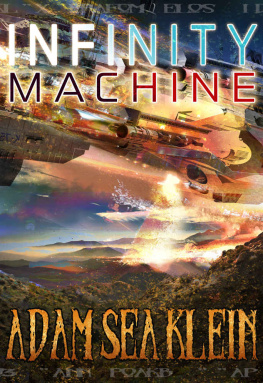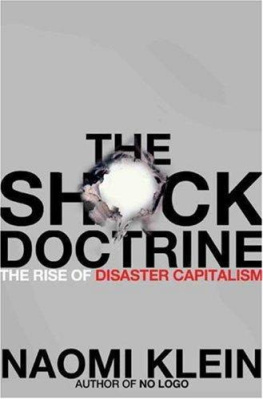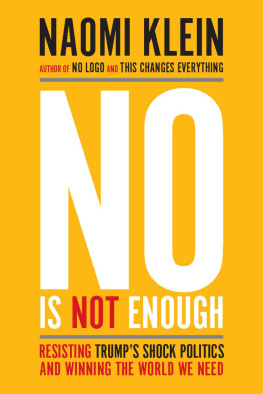Klein - The Shock Doctrine: the Rise of Disaster Capitalism
Here you can read online Klein - The Shock Doctrine: the Rise of Disaster Capitalism full text of the book (entire story) in english for free. Download pdf and epub, get meaning, cover and reviews about this ebook. City: London, year: 2014, publisher: Penguin Books Ltd, genre: Politics. Description of the work, (preface) as well as reviews are available. Best literature library LitArk.com created for fans of good reading and offers a wide selection of genres:
Romance novel
Science fiction
Adventure
Detective
Science
History
Home and family
Prose
Art
Politics
Computer
Non-fiction
Religion
Business
Children
Humor
Choose a favorite category and find really read worthwhile books. Enjoy immersion in the world of imagination, feel the emotions of the characters or learn something new for yourself, make an fascinating discovery.
The Shock Doctrine: the Rise of Disaster Capitalism: summary, description and annotation
We offer to read an annotation, description, summary or preface (depends on what the author of the book "The Shock Doctrine: the Rise of Disaster Capitalism" wrote himself). If you haven't found the necessary information about the book — write in the comments, we will try to find it.
Klein: author's other books
Who wrote The Shock Doctrine: the Rise of Disaster Capitalism? Find out the surname, the name of the author of the book and a list of all author's works by series.
The Shock Doctrine: the Rise of Disaster Capitalism — read online for free the complete book (whole text) full work
Below is the text of the book, divided by pages. System saving the place of the last page read, allows you to conveniently read the book "The Shock Doctrine: the Rise of Disaster Capitalism" online for free, without having to search again every time where you left off. Put a bookmark, and you can go to the page where you finished reading at any time.
Font size:
Interval:
Bookmark:


Naomi Klein is an award-winning journalist, author and filmmaker. Her first book, the international bestseller No Logo: Taking Aim at the Brand Bullies, was translated into twenty-eight languages and called a movement bible by The New York Times. She writes an internationally syndicated column for The Nation and the Guardian and reported from Iraq for Harpers magazine. In 2004, she released The Take, a feature documentary about Argentinas occupied factories, co-produced with director Avi Lewis. She is a former Miliband Fellow at the London School of Economics and holds an honorary Doctor of Civil Laws from the University of Kings College, Nova Scotia.
www.naomiklein.org
For Avi, again
Any change is a change in the topic.
Csar Aira, Argentine novelist, Cumpleaos, 2001
THE SHOCK DOCTRINE
Brilliant and horrifying
Patrick McGrath, Sunday Herald, Books of the Year
The Shock Doctrine aims its 10-foot-long middle finger at the Bush administration and generations of neocons whove chosen profits over people in war and disaster The Village Voice
You must read what may be the most important book on economics in the twenty-first century Dow Jones Business News
Her compelling study of the dark heart of capitalism
New York Observer
If you know people who still believe that free markets and democracy walk hand in hand, give them this for Christmas. This is past, present and future all in one
Peter Carey, Guardian, Books of the Year
Essential and compelling Irish Times
Anticipates the widespread disquiet nay, rage at the state of the world as successfully as her previous bestseller, No Logo Anyone who wishes to know what our children will believe should read The Shock Doctrine Nicholas Blincoe, Daily Telegraph
It will echo around the world Independent
Naomi Klein is one of the most important new voices in American journalism today, as this book makes clear. She has turned globalism inside out Seymour M. Hersh
Uncompromising, a fierce riposte to the doctrine of economic shock therapy Sunday Telegraph
She takes the central myth of the right that, since the fall of Soviet tyranny, free elections and free markets have skipped hand in hand together towards the shimmering sunset of history and shows that it is, simply, a lie written with a perfectly distilled anger, channelled through hard fact. She has indeed surpassed No Logo. Today, this brilliant book should stir a tsunami of shame and of political action Johann Hari, New Statesman
This masterful book is a measured but furious call to arms a spectacular triumph John Cusack
It could very well prove a catalyst, a watershed, a tipping point
Tim Robbins
With a bold and brilliantly conceived thesis, skilfully and cogently threaded through more than 500 pages of trenchant writing, Klein may well have revealed the master narrative of our time The Shock Doctrine could turn out to be among the most important books of the decade San Francisco Chronicle
The Shock Doctrine may be one of the most important non-fiction books aimed at the general reader published in the last decade
Toronto Star
Now the earth was corrupt in Gods sight, and the earth was filled with violence. And God saw that the earth was corrupt; for all flesh had corrupted its ways upon the earth. And God said to Noah, I have determined to make an end of all flesh, for the earth is filled with violence because of them; now I am going to destroy them along with the earth.
Genesis 6:11 (NRSV)
Shock and Awe are actions that create fears, dangers, and destruction that are incomprehensible to the people at large, specific elements/sectors of the threat society, or the leadership. Nature in the form of tornadoes, hurricanes, earthquakes, floods, uncontrolled fires, famine, and disease can engender Shock and Awe.
Shock and Awe: Achieving Rapid Dominance, the military doctrine for the U.S. war on Iraq
I met Jamar Perry in September 2005, at the big Red Cross shelter in Baton Rouge, Louisiana. Dinner was being doled out by grinning young Scientologists, and he was standing in line. I had just been busted for talking to evacuees without a media escort and was now doing my best to blend in, a white Canadian in a sea of African-American Southerners. I dodged into the food line behind Perry and asked him to talk to me as if we were old friends, which he kindly did.
Born and raised in New Orleans, hed been out of the flooded city for a week. He looked about seventeen but told me he was twenty-three. He and his family had waited forever for the evacuation buses; when they didnt arrive, they had walked out in the baking sun. Finally they ended up here, a sprawling convention center, normally home to pharmaceutical trade shows and Capital City Carnage: The Ultimate in Steel Cage Fighting, now jammed with two thousand cots and a mess of angry, exhausted people being patrolled by edgy National Guard soldiers just back from Iraq.
The news racing around the shelter that day was that Richard Baker, a prominent Republican congressman from this city, had told a group of lobbyists, We finally cleaned up public housing in New Orleans. We couldnt do it, but God did. All that week the Louisiana State Legislature in Baton Rouge had been crawling with corporate lobbyists helping to lock in those big opportunities: lower taxes, fewer regulations, cheaper workers and a smaller, safer citywhich in practice meant plans to level the public housing projects and replace them with condos. Hearing all the talk of fresh starts and clean sheets, you could almost forget the toxic stew of rubble, chemical outflows and human remains just a few miles down the highway.
Over at the shelter, Jamar could think of nothing else. I really dont see it as cleaning up the city. What I see is that a lot of people got killed uptown. People who shouldnt have died.
He was speaking quietly, but an older man in line in front of us overheard and whipped around. What is wrong with these people in Baton Rouge? This isnt an opportunity. Its a goddamned tragedy. Are they blind?
A mother with two kids chimed in. No, theyre not blind, theyre evil. They see just fine.
One of those who saw opportunity in the floodwaters of New Orleans was Milton Friedman, grand guru of the movement for unfettered capitalism and the man credited with writing the rulebook for the contemporary, hypermobile global economy. Ninety-three years old and in failing health, Uncle Miltie, as he was known to his followers, nonetheless found the strength to write an op-ed for The Wall Street Journal three months after the levees broke. Most New Orleans schools are in ruins, Friedman observed, as are the homes of the children who have attended them. The children are
Friedmans radical idea was that instead of spending a portion of the billions of dollars in reconstruction money on rebuilding and improving New Orleans existing public school system, the government should provide families with vouchers, which they could spend at private institutions, many run at a profit, that would be subsidized by the state. It was crucial, Friedman wrote, that this fundamental change not be a stopgap but rather a permanent reform.
Font size:
Interval:
Bookmark:
Similar books «The Shock Doctrine: the Rise of Disaster Capitalism»
Look at similar books to The Shock Doctrine: the Rise of Disaster Capitalism. We have selected literature similar in name and meaning in the hope of providing readers with more options to find new, interesting, not yet read works.
Discussion, reviews of the book The Shock Doctrine: the Rise of Disaster Capitalism and just readers' own opinions. Leave your comments, write what you think about the work, its meaning or the main characters. Specify what exactly you liked and what you didn't like, and why you think so.


